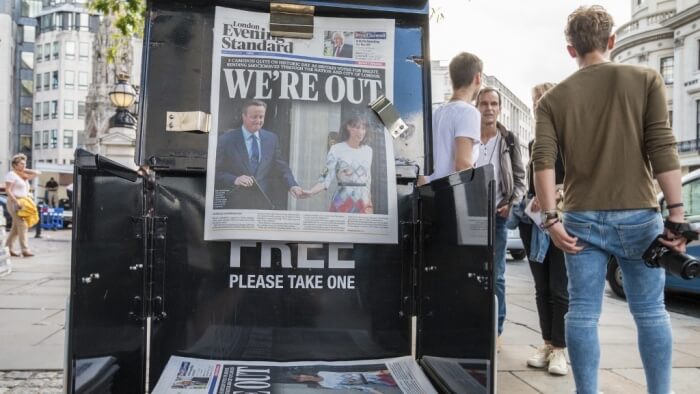It’s time we stopped hiding behind Brexit and plan for the future, otherwise we risk our place as a leader on the global stage.
Brexit: Why Businesses Have Time To Adapt
It’s time we stopped hiding behind Brexit and plan for the future, otherwise we risk our place as a leader on the global stage.

I’m a big believer that when things don’t go as planned you have to learn from it and find a new perspective.
The 24th June felt different though. It wasn’t a change to regulation, it wasn’t technology falling over, it wasn’t a customer backlash. It was like nothing we’ve seen before.
It was a shock, not because there hadn’t been the possibility it would happen, but because Brexit was now something totally beyond my control.
It’s a horrible feeling when you’ve built a business , especially as an outsider - I’m Australian - on using your expertise to deal with ambiguity on your client’s behalf, to suddenly have no idea what the future holds. I’d set up here because of all the benefits Europe afforded me.
I was suddenly looking over a cliff wondering if down was the only way to go, despite my Aussie glass half full attitude to life.
That’s perhaps what really surprised me. I had been rocked. But I soon realised that other companies had been set off balance more. The announcements said it all. Brexit was suddenly a reason to justify bad news.
Most memorably were the press releases on negative interest rates from Natwest, job cuts at Lloyds, and even the cancellation of staff parties by Global Radio.
It didn’t make sense. There are probably two years of negotiation ahead and the pragmatist in me started to shout loudly. It will be four years before we see a definite impact, so why were so many brands using it to justify actions? What did they know I didn’t? I’ve worked all over the world and thought I had a good handle on international markets and perspectives.
When I tried to answer the question I looked at my own business. As entrepreneurs we deal in the vague. It’s what makes us tick and I think it’s what makes us successful. Able to take calculated decisions on the facts we have and the ones we don’t and make our moves accordingly.
I certainly think it’s what makes self-starters stand apart from others. It’s a part of our inherent acumen to deal with uncertainty that has helps us grow. You can’t possibly achieve 300% growth as we have from not taking risks and failing to understand your market and how it behaves.
It seemed to me that these companies were taking an easy option out, and I found it disappointing. Frustrating. Depressing even.
I wasn’t alone. As clients started to call to discuss the way we could help them manage the ‘ifs’ and the ‘maybes’, I realised two things: One, we are all in the same boat and the ones that will survive are the ones who seize the day and have a global outlook, and two, with that in mind, I could use it as a reason to accelerate a plan I had been mulling over, just as my clients could use it as a way to try something radical.zz
We could open an office in Spain. Why not? Why should Brexit stop us from replicating our success in the UK somewhere else?
My thought process was lead by skill. No business can operate without it and until we know what will happen with free movement, I have to assume I won’t have access to the same European skills I’m privileged to have today working in the UK and across Europe for me.
That really will be a massive blow. But by opening an office in Spain I hedge my bets. Spain represents an untapped market for us. It shares common market dynamics to the UK and we can have an immediate impact by taking advantage of relationships we have that extend beyond the UK.
It makes perfect sense. Keep an existing market alive by advising on how innovation could help companies take advantage of change, and grow a new market doing what we do best with a tried and tested formula.
I’ve weighed everything up and I think they are two really important things to take from Brexit. We have to innovate in the UK to stay competitive and we have to take a fresh look at skills.
Let’s take how roaming regulation could change in the mobile world for example. No company ever has four years to properly plan a new product or service. But with Brexit they do. We have to assume things will change. It gives operators time to think about how they could steal market share and shore up loyalty by doing something different. Something unexpected.
I’m sure banking to pharma have similar opportunities. Clearly, I’m not going to deny that there will be industries that will suffer from lack of subsidy, or a review of red tape. There will be tough times ahead. But when budgets are tight and the pressure is on often we come up with our best ideas and innovation takes off. We need to take the cue Brexit gives us to challenge ourselves, our ideas and fight. This is no time for flight.
Skills is the other avenue to explore. It’s really a no brainer for me. So many businesses I work with, partner with and admire use skills from Europe to achieve the results they do. It’s a combination of education standards, drive and the importance of experience of working in other countries that can help your company thrive.
I’m going to take my business to the skills in Spain, but not everyone will be able to do that. So there’s also going to be a huge need to look at how we close the skills gaps here in the UK.
What business secondments, or exchange programmes can happen in the next few years so that people get the experience of working in Europe and bring it home to the UK? I think there are compelling arguments for talent teams to put in place strategies that act as an insurance policy now.
What gaps do we have in our pool of local skills, and why do we need European skills in the first place? Why can’t we rely on our own people? Essentially it comes down to how well we equip young people to make a difference in business.
I think Brexit gives us a chance to review mentoring in schools and inspire generations of workers who want to set up their own businesses, as much as they want to be part of a business’ success. Help them understand what it takes, appreciate it’s not all academia. It’s a desire to win, knowledge that there are ‘life skills’ needed, and most importantly that they need a thirst to work their way up so they learn the ropes and build their skills gradually to have fulfilling careers.
It won’t be easy and the way ahead may not be obvious but I’m sure the UK has the spirit to succeed. Unless we start to see Brexit as an opportunity for revamping skills and investing in innovation, our position as a global leader will wane. We need a plan now and hiding behind the negatives rather than the positives will only create a self-full filling prophecy.
Carpe Diem, or as we’d say in Oz ‘throw us another tinnie and let’s get this barbie cranked up …’
Thanks for signing up to Minutehack alerts.
Brilliant editorials heading your way soon.
Okay, Thanks!




